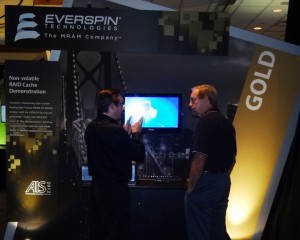 This week at AIS 2012, Everspin Technologies announced commercial production of the first ever Spin-Torque Magnetoresistive RAM (ST-MRAM).
This week at AIS 2012, Everspin Technologies announced commercial production of the first ever Spin-Torque Magnetoresistive RAM (ST-MRAM).
This new type of ultra-low latency and high-performance memory is expected to transform storage architecture, while driving the continuous evolution of Moore’s Law. Sampling has already begun with select customers, and Everspin is engaging strategic partners to prepare design and manufacturing ecosystems.
ST-MRAM is performance-optimized Storage Class Memory (SCM) that bridges the role of today’s conventional memory with the storage systems of tomorrow’s demands by providing non-volatility, high endurance, and ultra-low latency. Everspin’s 64Mb device is the first product in its roadmap; which is planned to scale to gigabit density memories with faster speeds.
ST-MRAM will give designers of high performance storage systems the ability to achieve ultra-low latency, increase reliability with high cycling endurance, and protect data in the event of power loss. A prime example of potential use is in the arena of cloud storage — as more and more users and content are added, faster and consistent data storage is a necessity.
According to Joseph Unsworth, research vice president at Gartner, “The properties of ST-MRAM are particularly appealing to the enterprise SSD market because of its ability to enhance and complement the flash memory technology. The commercialization of this technology is an important industry milestone that should continue to drive SSD proliferation in data center and in-memory computing architectures.”
Everspin’s proprietary Spin-Torque technology utilizes a spin-polarized current for switching. Data is stored as a magnetic state rather than an electronic charge. This provides a non-volatile memory bit that does not suffer from wear-out or data-retention issues that are associated with Flash technology. Everspin’s 64Mb ST-MRAM is functionally compatible with industry standard JEDEC specification for the DDR3 interface, which delivers memory bandwidth that translates to up to 3.2GB per second at nanosecond class latency. The product is being offered in an industry standard WBGA package that aligns with the DDR3 standard.
Everspin’s ST-MRAM will give system designers the benefit of persistent, high endurance storage or memory for applications that demand better reliability and will benefit from the performance boost of DDR3 speed. The 64Mb density MRAM provides an excellent entry point for non-volatile buffer and cache memory in solid state and RAID storage systems as well as storage appliances. Everspin’s 64 Mb device will complement existing lower-cost memory technologies, and help reduce overall system cost and complexity.
Phill LoPresti, president and CEO of Everspin Technologies, states: “Data has transcended from being a buzzword to where it’s an invaluable commodity. At the heart of the data revolution is the issue of how to store, manage, and retain it securely, efficiently, and cost-effectively. Our first ST-MRAM product has the potential to carry today’s high performance storage systems to greater heights. We are collaborating with select customers to allow them to evaluate and take advantage of Spin-Torque MRAM technology sooner and to gather feedback that will help us finalize our 64Mb DDR3 ST-MRAM for production”
Everspin is manufacturing ST-MRAM on its 200mm production line at Chandler, Arizona and is collaborating with industry leaders to establish 300mm MRAM tools and additional fab capacity. Everspin is also working with select design partners to ensure that the required tools and support are in place to drive the rapid adoption of ST-MRAM; including the necessary memory controllers, memory modules (DIMMs), and evaluation platforms.
Everspin is shipping working samples of the 64Mb DDR3 ST-MRAM to select customers and will be announcing broad availability in 2013. Also, Everspin is offering ST-MRAM non-volatile random access memory modules in industry standard configurations, and PCIe FPGA platforms are available now , allowing customers to start designs. The complete press release is available here.
 The SSD Review The Worlds Dedicated SSD Education and Review Resource |
The SSD Review The Worlds Dedicated SSD Education and Review Resource | 

Wow. This is one of those rare times when one of those “scientific breakthrough” articles actually resulted in a real and significant product. This will completely change the enterprise non-volatile memory market in the years to come. Can you imagine a SSD with 500x times 4k write performance? I think it is about time we get SATA4!
It certainly makes one wish they had money to invest in this new tech.
So it is a cache system for SSDs? How can we RAID it?
It isn’t a cache system for SSDs…..yet. At this point it is just non-volatile memory that has yet to be put into actual products. Everspin, from the article, seems to be sending review samples of the memory to various companies who will test it and decide if they want to include it in one of their products. I’m sure one of those products will be a SSD using this as memory as a cache for the NAND. Eventually we may see SSDs using this memory instead of NAND. Since this first chip is only 8MB, that will be awhile.